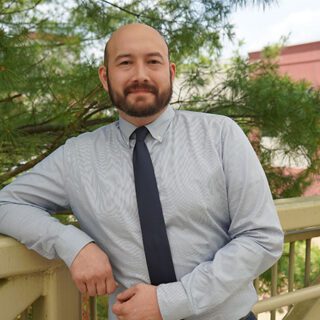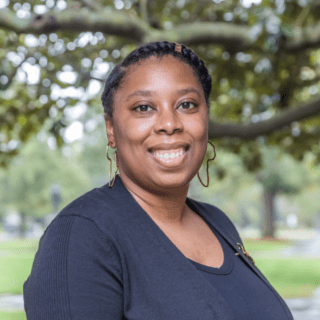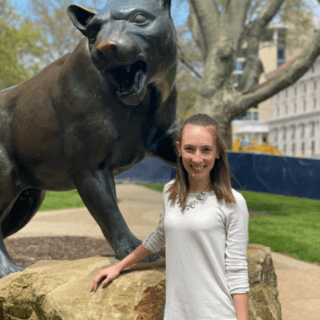
PhD Graduate Wins National Science Award for Dissertation
When he was a math teacher in Detroit, Michigan, Eben Witherspoon noticed a curious behavior among his students. The girls in his classroom were outperforming the boys academically, but in their after-school robotics club, they were less likely to take on math-intensive roles, like computer programming.
The girls were just as good, if not better, at programming. Yet, they consistently opted out.
“I got interested in why that gender difference appears,” says Withersoon, who later enrolled in the PhD program in learning sciences and policy (LSAP) at the University of Pittsburgh School of Education.
Witherspoon’s dissertation, “Localizing and Understanding Mechanisms of Gender Differences within Pathways Towards and Away from Science Degrees,” gave him the opportunity to explore a different area of gender inequity in the STEM (science, technology, engineering, and mathematics) fields.
He examined why undergraduate women who plan to enroll in medical school have a significantly higher level of attrition compared to men. Specifically, when are women dropping out in the undergraduate years and what beliefs were shaping this decision?
“This is super problematic not just from an equity perspective but also in thinking about all the valuable resources we are losing there. Half the population are women, and they are performing highly and can bring a lot to the profession,” says Witherspoon.
Witherspoon’s dissertation received the 2021 NARST Outstanding Doctoral Research Award. The national award is given annually to one doctoral dissertation judged to have the greatest significance in the field of science education.
Gender Inequity in the Pathways to Medical School
Witherspoon’s research found that a trigger for women in leaving the pathway to medical school are the so-called “weed-out” courses, which include organic chemistry and physics. However, it didn’t occur because they earned poor grades. In fact, it was actually the women who earned high passing grades who were more likely than men to stop their pursuit of medical school. Worse, many would also leave the STEM fields all together.
“There is a lot more than just grades that explain why people make decisions,” says Witherspoon. “In some of these courses, men and women earned high passing grades of ‘A’ or ‘B,’ but within those students women were twice as likely to make the choice to not continue.”
This problem is somewhat unique to the United States. Medicine is not offered as an undergraduate degree here, but it is offered as an undergraduate degree in other countries. In other countries, the proportion of female-to-male physicians is about 70-30 percent, whereas in the United States the ratio is closer to 50-50.
Witherspoon says his research opened his eyes to the importance of reframing how gender inequity is understood in the STEM fields or medicine.
“There is a lot of talk about this pipeline to science, which people are starting to think is a problematic metaphor. A pipeline means people are shoved in at the beginning and if they don’t continue they are falling out of the pipeline,” says Witherspoon. “It’s a lot more about the different pathways that people pursue. We are now understanding that college classes are continuing to impact decision making in a certain trajectory.”
The Power of the LSAP Program
Christian Schunn, who served as Witherspoon’s doctoral advisor, says that Witherspoon’s award-winning dissertation examined an underexplored area of gender inequity in medicine.
It didn’t surprise him to see Witherspoon produce an impactful work as a young scholar.
“He really inhaled being in grad school. It was such a pleasure to work with someone who wanted to learn all the things,” says Schunn, who is a professor of psychology learning sciences, senior scientist at the Learning Research and Development Center, and co-director of the Institute for Learning at Pitt.
Witherspoon is the third student from the Pitt School of Education to receive the NARST Award since it was created in 1992. According to Schunn, programs like the PhD in Learning Sciences and Policy have a successful track record because of their emphasis on collaborative, mentor-guided research throughout the program.
Witherspoon, who graduated from the Pitt School of Education in 2019, is now a researcher at the American Institute for Research in Chicago. He continues to conduct research on a range of education-based topics.
His dissertation connected to a truth he observed in the classroom as a teacher in Detroit. The girls there were doing well in math, but like the women on a pre-medicine path in college, they were still removing themselves from the pathway.
“I joined the Pitt PhD program to explore issues like this,” says Witherspoon. “It allowed me to maintain my initial interest in wanting to be a teacher to help students be successful, while also providing me with new skills to learn how to research those things empirically.”
Learn More
The PhD program in Learning Sciences and Policy is now accepting applications. Please contact us at soeinfo@pitt.edu to learn more.




